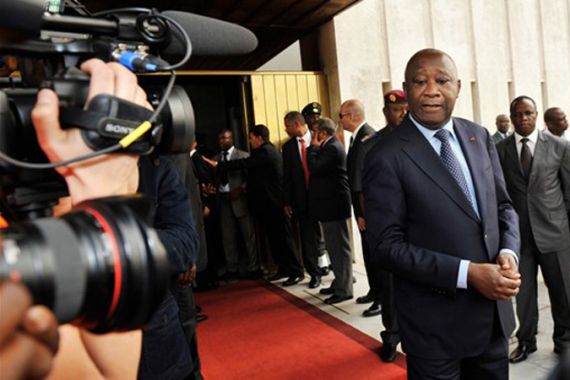African pressure mounts on Gbagbo
Leaders launch fresh push for diplomatic solution to Cote d’Ivoire deadlock while not ruling out military option.

 |
|
Odinga, left, Kenya’s prime minister, met Gilbert Ake, right, Gbagbo’s prime minister, among other officials [Reuters] |
African powers have launched a fresh diplomatic push for a peaceful solution to Cote d’Ivoire’s crisis by piling pressure on Laurent Gbagbo to give up the presidency and avoid an armed intervention.
Four leaders representing West African regional bloc ECOWAS and the African Union met the Ivorian president in Abidjan, Cote d’Ivoire’s main city, on Monday to urge him to step down after UN-certified results showed he lost the election.
Raila Odinga, the Kenyan prime minister, named by the African Union to try to broker an end to the standoff between Gbagbo and the man the world says beat him to the presidency, Alassane Ouattara, arrived in Cote d’Ivoire on Monday.
On his way there, Odinga, who has previously called for Gbagbo’s removal by force, met Goodluck Jonathan, the Nigerian president, who also heads the 15-nation Economic Community of West African States (ECOWAS).
On the eve of the talks, Odinga said he would keep an open mind on finding a solution for Cote D’Ivoire.
“We don’t want to pre-empt anything. We just want to talk to him [Gbagbo] and we will see what happens,” he said.
“It depends on how Gbagbo wants to handle it.”
‘Not an ultimatum’
ECOWAS has said it could use “legitimate force” if Gbagbo refuses to go quietly and a spokesman for Ouattara’s rival government has said this will be Gbagbo’s last chance to step down peacefully and with immunity.
However, Doukoure Abram, ECOWAS representative for the Cote d’Ivoire, said in an interview with the Reuters press agency that the mission would not repeat an ultimatum for Gbagbo to leave or face force.
“No, there will be discussions going on,” he said, noting that the mission would also meet Ouattara.
Al Jazeera’s Ama Boateng, reporting from Abidjan, said: “A show of unity underlined to Laurent Gbagbo that he must hand over power.
“Again and again, he’s made it clear that he’s not going anywhere.”
Fears of violence
Meanwhile, the UN said that it was still worried about extra-judicial killings and kidnappings by pro-Gbagbo forces.
Simon Munzu, the head of human rights for the UN’s mission in Cote I’voire, told Al Jazeera that the actual number of people killed in post-election violence could be much more than the current estimate of 179 people.
“The real number will be higher than that as we don’t claim to have information about every single case,” he said.
“We have recorded cases where we have been able to verify the facts with our own staff or information that is reliable, notably from family members.”
Benin’s Boni Yayi, Sierra Leone’s Ernest Koroma and Cape Verde’s Pedro Pires have so far failed to convince Gbagbo to step down despite ECOWAS brandishing the threat of military intervention to oust him if mediation fails.
“Odinga’s personal experience in Kenya was one of power-sharing, but that is something that Ouattara and his supporters have said they are not willing to accept,” Al Jazeera’s Boateng said.
“It has only been a week since the ECOWAS presidents were in Cote d’Ivoire, but we have to now wait and see what is discussed – we do know that diplomacy is the preferred route.”
If dialogue fail
West African regional military chiefs met in Abuja last week and set in motion plans to oust Gbagbo if negotiations fail, according to a Nigerian defence spokesman.
A follow-up meeting to fine-tune the “last-resort” plan is scheduled for Mali on January 17 and 18.
Tensions have risen steadily in the deadly standoff since Gbagbo and Ouattara both claimed victory in a November 28 presidential runoff vote that it was hoped would end a decade of crisis in Cote d’Ivoire.
Calls have also grown for alleged massive human rights violations to be investigated, including reports of mass graves of Gbagbo’s opponents.
The UN says that at least 179 people have been killed in post-election violence but that it has been unable to fully investigate because of attacks on its personnel.